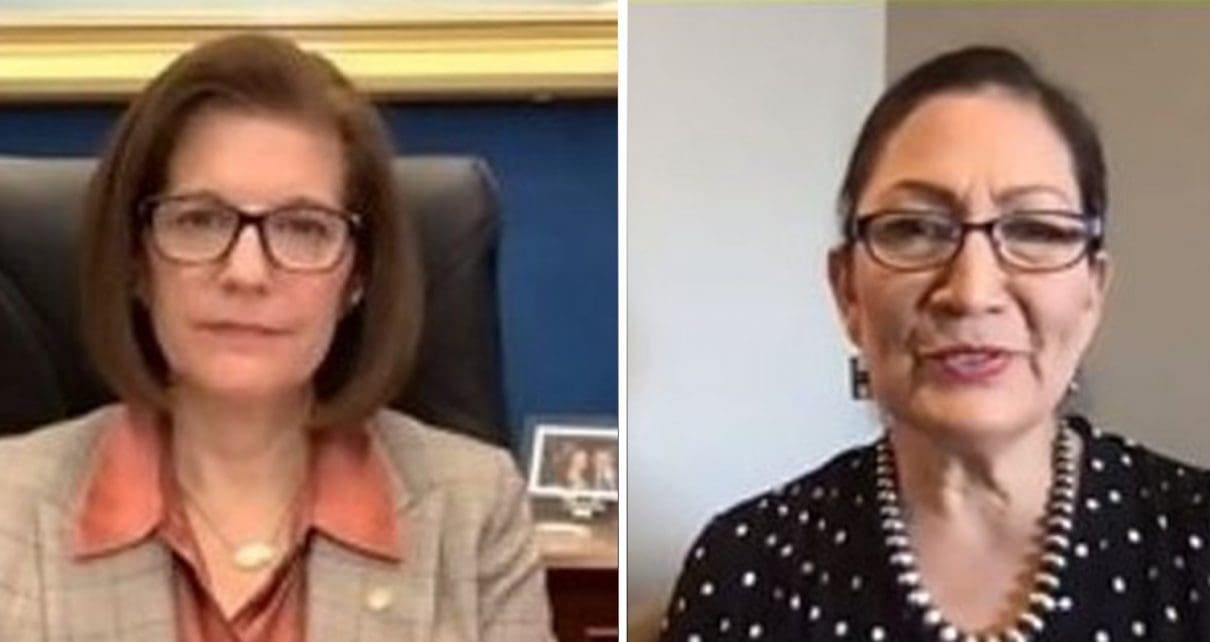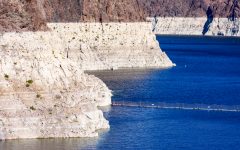
Senator Cortez Masto and Interior Secretary Deb Haaland (Photo: @SenCortezMasto)
$4 Billion Of Drought Funding in Inflation Reduction Act ‘Will Accomplish Nothing’
GM of Southern Nevada Water Authority sharply challenges Sen. Cortez Masto’s claims
By Megan Barth, August 16, 2022 11:40 am
Democratic Senator Catherine Cortez Masto voted for the Inflation Reduction Act and has made claims that the $4 billion secured in the act will “combat drought in the Western U.S.” Her statement below reads that the $4 billion will fund the Bureau of Reclamation, a federal agency under the U.S. Department of the Interior headed by Deb Haaland.
Proud to join @SenMarkKelly and @SenatorBennet in securing $4 billion in the Inflation Reduction Act to combat drought in the Western U.S.
Read our statement below. pic.twitter.com/CvqwCmW8xn
— Senator Cortez Masto (@SenCortezMasto) August 5, 2022
The Inflation Reduction Act is the most significant action that the Senate has ever taken to tackle the climate crisis. I'm proud I helped secure $4 billion to combat drought in Nevada and the West, and I'll keep working to address our state's water needs.https://t.co/1JKunHcdvq
— Senator Cortez Masto (@SenCortezMasto) August 9, 2022
However, the General Manager of the Southern Nevada Water Authority, John Enstminger, sharply challenges Cortez Masto’s claims, in a detailed report published by the Las Vegas Review Journal, by pointing out that the billions in subsidies to farmers will be “blown through and accomplish nothing in terms of the long-term sustainability.”
The $4 billion in drought relief that is included in the Inflation Reduction Act, which President Biden is expected to sign Tuesday, will likely play a major role in those agriculture reductions. Much of that funding will likely go toward paying farmers to voluntarily reduce their water use by changing out their crops or fallowing their fields.
But the costs of such proposals that have been put forward, including one from Yuma farmers to take 925,000 acre-feet less of Colorado River water next year in exchange for $1.4 billion, or roughly $1,500 per acre-foot, are far above the going prices of water.
Entsminger told the Review-Journal that those irrigation district proposals would do little to address the long-term drought issues that the Colorado River system is facing.
“At those types of prices, you’re going to blow through all $4 billion and have accomplished nothing in terms of the long-term sustainability of the river,” Enstminger said. “Those $4 billion need to be spent on permanent water savings and protecting affected communities or it’s not going to make a meaningful difference.”
As reported by The Hill on Monday, Entsminger referred to “drought profiteering” in letter sent to federal officials writing that that the last three months of talks have “produced exactly nothing in terms of meaningful collective action to help forestall the looming crisis adding that “Through our collective inaction, the federal government, the basin states and every water user on the Colorado River is complicit in allowing the situation to reach this point.”
Earlier this year, the federal government gave the states an Aug. 15 deadline to reach a deal for 15 percent cuts to water usage or the federal government would impose the cuts unilaterally.
As of this morning, with water negotiations failing to reach a deal, The Hill reports that the federal Bureau of Reclamation officials “announced cuts to the yearly water allocation to Arizona and Nevada, as well as Mexico, which is also party to the compact. The bureau will withhold about 21 percent of Arizona’s yearly water allocation next year, as well as 8 percent of Nevada’s.”
- Illegal Alien Identified As Wrong-Way Driver in Fatal Crash That Killed LVMPD Officer - December 23, 2024
- Senator Rosen Joins Letter Raising Concerns About Pete Hegseth’s Nomination - December 20, 2024
- NV SOS Launches Four Investigations Into 2024 Election Violations - December 20, 2024




